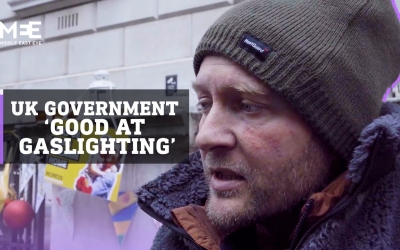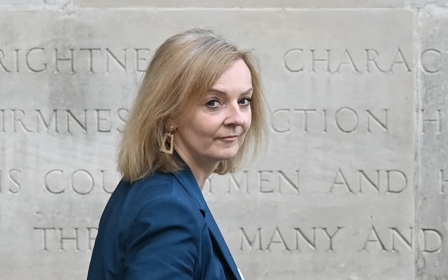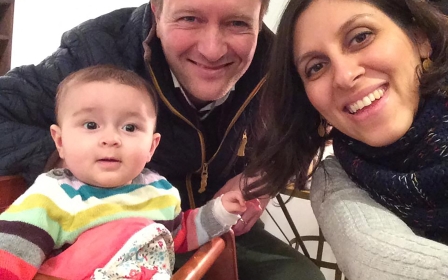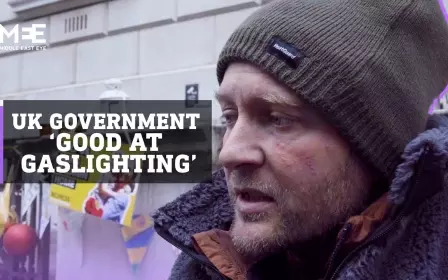Iran: UK officials 'discussing' how to repay £400m debt
UK government officials visited Tehran last week to discuss legal ways for Britain to pay a four-decade-old £400m ($530m) debt to Iran, the Iranian ambassador to the UK has said.
Mohsen Baharvand told reporters on Friday that "obstacles are not insurmountable" regarding the payment and that he was in ongoing talks with the UK's foreign office.
Iranian state TV has previously suggested that the payment, stemming from an arms deal with Iran's shah that was cancelled after the 1979 Islamic Revolution, could be tied to a deal that would release detained British-Iranian aid worker Nazanin Zaghari-Ratcliffe, although the UK and US have denied this.
'We signed it but two days after the signature of that deal the UK government said they could not implement it because of US sanctions'
- Mohsen Baharvand, Iranian ambassador
Earlier this week, UK Foreign Secretary Liz Truss acknowledged that the UK owed the debt during a question-and-answer session at Chatham House, a UK think tank.
According to Baharvand, Iran and the UK had been close to an agreement on the debt in the summer, the Guardian reported.
“We wanted to use that deal to ask our people that we are seeing a good sign from the UK and then that gives us a possibility to expedite our efforts to help the dual nationals and things like that. Then we had a deal.
"We signed it but two days after the signature of that deal the UK government said they could not implement it because of US sanctions,” he said.
Asked if the US could provide a letter to the UK to guarantee that the payment would not be sanctioned, Baharvand said: “The US are not doing that. They have to help the UK government to do that. It is not impossible.
"Obstacles are not insurmountable, but we have to discuss, negotiate and find a way.
"We are now discussing through what channel that money be transferred. There is a negotiating process now.”
'Foreign Office is very good at gaslighting'
Families of UK dual nationals detained in Iran, as well as former UK foreign secretary Jeremy Hunt, have said they do not believe those detained will be released until the debt is paid.
Hunt told BBC Radio 4’s Today programme last month that "practicalities" were holding the UK back from paying off the debt to Iran.
Zaghari-Ratcliffe, a British-Iranian dual national, was arrested in 2016 as she was leaving Iran after taking her then 22-month-old daughter to visit her family.
Zaghari-Ratcliffe's husband, Richard Ratcliffe, has insisted that the case against his wife is a sham and is being used as a bargaining chip by Tehran to secure the debt payment from the UK.
“The [UK] foreign office is very good at gaslighting," he told Middle East Eye last month while on hunger strike over his wife's case.
"It’s very good at claiming it’s doing things that it isn’t. I think it’s perfectly clear after five and a half years that their approach is unsuccessful.”
Among other high-profile British-Iranian citizens detained in Iran is Anoosheh Ashoori, who has been held at the notorious Evin prison in Tehran for four years on disputed spying charges.
Prolonged legal case
Shortly before the 1979 Iranian Revolution that overthrew Shah Mohammad Reza Pahlavi, the British government struck an arms deal with the shah to sell more than 1,500 Chieftain battle tanks and 250 repair vehicles to Iran.
Iran paid £600m ($795m) for the tanks in advance, but having delivered only 185 tanks, Britain refused to deliver the remaining equipment when the shah was deposed.
The international court of arbitration in The Hague ordered Britain to pay the debt in 2001, a ruling upheld in 2009.
However, the two governments have been locked in a prolonged legal battle in the British courts over the exact sum owed and whether or not the UK should pay interest on it.
Middle East Eye propose une couverture et une analyse indépendantes et incomparables du Moyen-Orient, de l’Afrique du Nord et d’autres régions du monde. Pour en savoir plus sur la reprise de ce contenu et les frais qui s’appliquent, veuillez remplir ce formulaire [en anglais]. Pour en savoir plus sur MEE, cliquez ici [en anglais].





